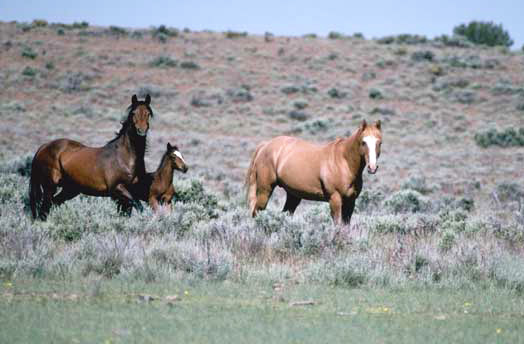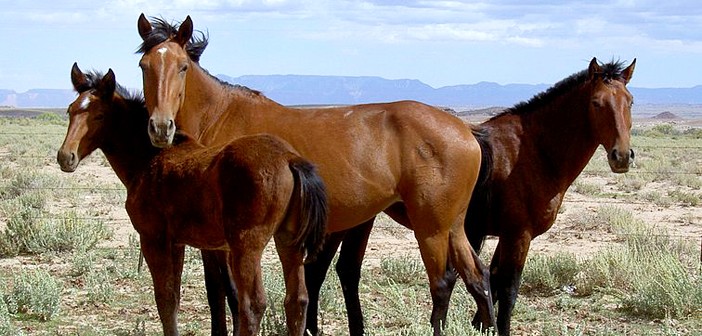Their manes flowing in the wind, wild horses represent the essence of the joy and freedom of the wild – a state of grace and innocence. In the early morning they amble single file towards a stream where they drink and splash in the water. Then they run and play along the hillsides, stopping here and there to munch the sage brush, happy under the wide sky. On the open lands of the western states, they can run all day and stop to rest under the shade of rock cliffs or juniper trees.
During the fifteenth and sixteenth centuries, the Spanish arrived in the Americas, bringing horses with them. When they sailed away, they left the horses behind. Over the next 500 hundred years, the wild horse population grew until, by some estimates, it reached two million. By the 1950s though, their population had plummeted; they were being hunted and poisoned. The first steps were taken to protect them.
Are the American horses of the west, sometimes called mustangs, really a native wild species or are they instead, a once-domesticated, feral species?
In an August 26, 2015 article, in the Reno Gazette Journal (see the link below), Craig Downer, wildlife ecologist and author of the book, The Wild Horse Conspiracy, makes the case that they are native and wild, as he replies to an earlier July 19 editorial in the Elko Daily Free Press, “Petition confirms horses aren’t wild.”
 First of all — before we examine Craig Downer’s insightful observations — we may wonder, does it really matter whether wild horses are native or not? Well, one could certainly argue that it shouldn’t. A horse is a horse. An animal is an animal. The misguided policy of U.S. federal and state government agencies discriminating against and sometimes killing hundreds, thousands, and even millions of individuals because their species has been deemed “non-native” or “invasive” is the source of significant cruelty and is often counter-productive. Even species universally acknowledged to be native, like red-winged blackbirds and American crows, are often subject to mass extermination if they are deemed to be, for example, guilty of “crop depredation.”
First of all — before we examine Craig Downer’s insightful observations — we may wonder, does it really matter whether wild horses are native or not? Well, one could certainly argue that it shouldn’t. A horse is a horse. An animal is an animal. The misguided policy of U.S. federal and state government agencies discriminating against and sometimes killing hundreds, thousands, and even millions of individuals because their species has been deemed “non-native” or “invasive” is the source of significant cruelty and is often counter-productive. Even species universally acknowledged to be native, like red-winged blackbirds and American crows, are often subject to mass extermination if they are deemed to be, for example, guilty of “crop depredation.”
A native wild bird or animal isn’t necessarily covered by state or federal protection, even when one would certainly think that it must be.
However, an even worse situation awaits those species determined to be “non-native.” They are actively discriminated against, persecuted, killed by official government agencies, and, even in cases where they are much loved by the American public – as are the wild horses – they can be systematically tormented and deprived of their freedom.
Therefore, it does matter. Because they are considered “feral,” wild horses are afforded very little actual protection.
The intention of the Wild Free-roaming Horses and Burros Act of 1971 was to provide a humane way to relate to wild horses.
Unfortunately, it has instead led to the current situation, whereby, in areas where there is an “overpopulation” of wild horses, the Bureau of Land Management, which is charged with their care, will capture them, often by brutal helicopter round-ups, and will offer them for adoption. Even when this works as it is supposed to, it splits up their families and life-long friendships and deprives them of their natural lives in the wild. Anyone with any sensitivity to wildlife will be aware that removing a wild animal from his or her life in the wild deprives the animal of much that gives meaning to their lives. It is the undeserved imprisonment of a free spirit.
The BLM report updated on September 8, 2015 lists twenty round-ups by helicopter carried out so far during 2015, during which 3,307 horses and burros were removed from the wild in the states of Wyoming, Colorado, Arizona, Oregon, California, Nevada, Utah, Montana, and Idaho.
 Only about one in three of the horses rounded up, over recent decades, has been adopted; the rest are held in perpetuity in holding facilities. By 2012 there were around 35,000 American wild horses still roaming free, and around 47,000 being confined indefinitely in government holding pens.
Only about one in three of the horses rounded up, over recent decades, has been adopted; the rest are held in perpetuity in holding facilities. By 2012 there were around 35,000 American wild horses still roaming free, and around 47,000 being confined indefinitely in government holding pens.
There is a vast catalog of injustices happening to the wild horses. Just one example is the fact that much of their historical territory has been leased for cattle grazing. Herd management areas for wild horses have dwindled to only 10% of the amount of land allocated to cattle grazing. Whenever there seem to be too many wild horses for one of the limited areas allotted to them, their numbers may be construed as a threat to cattle grazing, leading to another charge of “overpopulation” and another helicopter round-up.
Continued in part two…
Copyright © Sharon St Joan, 2015
Top photo: John Harwood / Wikimedia Commons / “This file is licensed under the Creative Commons Attribution 2.0 Generic license.” / Wild horses near Chinle, Arizona.
Second photo: Bureau of Land Management, Office of Public Affairs / Wikipedia Commons / “This work is in the public domain in the United States because it is a work prepared by an officer or employee of the United States Government as part of that person’s official duties under the terms of Title 17, Chapter 1, Section 105 of the US Code. See Copyright. / Wild stallion, Lazarus, and part of his band in West Warm Springs HMA, Oregon.
Third photo: SteppinStars / Wikimedia Commons / “This file is made available under the Creative Commons CC0 1.0 Universal Public Domain Dedication.” / Wild horses in Wyoming.
Craig C. Downer’s book, The Wild Horse Conspiracy, is available on Amazon. Click here.
To read Craig Downer’s article, in the Reno Gazette Journal, click here.
To read Ross MacPhee’s original article, on the Cloud Foundation website, click here.
To read THE WILD FREE-ROAMING HORSES AND BURROS ACT OF 1971 (PUBLIC LAW 92-195), click here.






2 Comments
Excellent article, Sharon, and thanks for the quote. Yes, the so-called “overpopulation is such a fatuous lie! We must continue to stand up for the magnificent horses and their right to live free in a world they restore in so many ways!
Nice to visit your blog again, it’s been many months for me. This is the post I’ve been waiting for a long time. Thanks, great sharing.